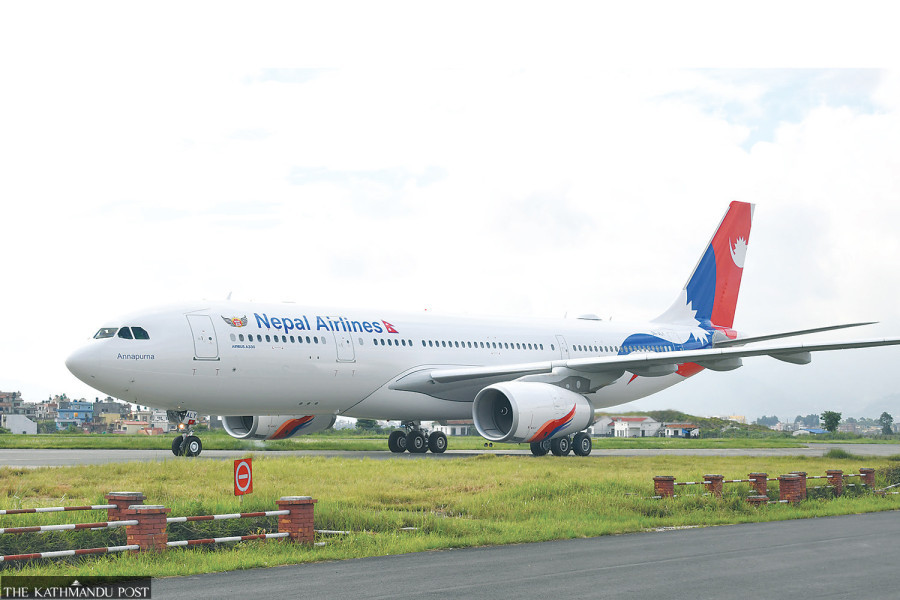Money
Nepal’s court summons foreigners and firms implicated in 2017 Airbus deal
On April 4, the anti-graft body completed its five-year probe into the $209.6-million deal to buy two new jets.
Sangam Prasain
The Special Court on Monday issued summons for five foreign individuals and five companies to attend a case progression hearing in connection with the April 2017 Airbus A330s deal, commonly known as the ‘wide-body scam’.
The notice issued by the court reads, “According to the report of Deepak Prasad Khatiwada, an investigation officer at the Commission for the Investigation of Abuse of Authority, in the case of committing corruption by acting with mala fide intention of gaining illegal benefits and causing loss, with the government of Nepal as plaintiff and you as defendants, a charge sheet has been filed in this court against you on April 4, 2024.”
“We have given them 15 days from the date of publication of the process, excluding the time required for the journey,” said Dhan Bahadur Karki, spokesperson at the Special Court. “The court can grant a further 15 days to the defendants for filing their replies.”
“If they fail to appear at the hearing within the stipulated time, an action shall be initiated against them in accordance with the law.”
The anti-graft body has also implicated Deepak Sharma (passport number 511341393), a citizen of the United Kingdom and former president of Integrated Supply Chain Solutions-Commercial of AAR International Inc., state of Illinois, USA.
Similarly, the anti-graft body has implicated Christian Nuehlen (passport number C4KH6C406/Germany), a German citizen and former director of Hi Fly X Ireland Limited, Dublin, and former representative of German Aviation Capital GMBH.
Oleg Calistru (passport number 14997769/Romania), a citizen of Romania and Moldova and former finance director of German Aviation Capital, Germany, has also been implicated in the corruption case.
The court has also issued summonses for five foreign companies: AAR International Inc., USA; German Aviation Capital GmbH, Germany; Hi Fly-Transporte Aereos (Hi Fly Airlines), Portugal; HI Fly X Ireland Limited, Ireland; and Escrow Agent Norton Rose Fulbright LLP, Germany.
According to the notice, the court has also summoned Escrow Agent Norton Rose Fulbright LLP Germany, which was jointly appointed by the consortium of AAR International, German Aviation Capital, and Hi Fly-transporte Aereos, including the special purpose company Hi Fly Ireland and the main actors of that company—Markus Radbruch, head of aviation, and Ralf Springer, senior consultant.
On April 4, Nepal’s anti-graft body completed its five-year probe into the $209.6-million Airbus deal, the largest ever in Nepal’s aviation history. The body concluded that Nepal Airlines Corporation's procurement of two wide-body Airbus A330 jets caused the government a loss of Rs1.47 billion ($13.38 million). The case has implicated 32 individuals.
The loss was calculated based on the exchange rate at the time of the payment of the last instalment in 2018.
The first of the two wide-body aircraft—Annapurna—arrived at the Tribhuvan International Airport in June 2018. The second aircraft, Makalu, arrived a month later.
The accused are former tourism minister Jeevan Bahadur Shahi, former managing director of Nepal Airlines Sugat Ratna Kansakar, former tourism secretary Shankar Adhikari and former finance secretary Shishir Kumar Dhungana.
At the time of the deal, Adhikari and Dhungana were on the board of the national flag carrier.
Other officials who were automatically suspended following the filing of the case include Buddhi Sagar Lamichhane, sitting joint secretary of the tourism ministry; Janak Raj Kalakheti, deputy managing director at Nepal Airlines; and senior captains of Nepal Airlines—Subash Rijal, Rabindra Sherchan and Shrawan Rijal.
Similarly, other senior sitting officials of Nepal Airlines, Upendra Paudel, Paras Paudel and Brihat Man Tuladhar, have also been suspended.
As per the charge sheet, the minister and the Nepali officials had gone against the procurement law and accepted the supplier’s escalation condition to purchase second-hand aircraft, a condition which amounted to $6.78 million (Rs74.58 million) of the $209.6 million valuation.
Escalation condition is a rule in a contract that says if certain things change, like prices, the contract terms can also change. Investigators suspect the condition was included in the $209.6 million deal to covertly generate kickbacks for the officials involved.
The charge sheet reads that while finalising the major technical specifications, the maximum takeoff mass (MTOM) of the aircraft was decreased from 242 tonnes to 230 tonnes. Investigators suspect financial embezzlement here.
The maximum takeoff mass (weight) affects an aircraft’s takeoff distance, rate of climb, payload capacity, and range.
The probe found that the Nepali officials made payment for 242 tonnes, but ordered the aircraft with a capacity of only 230 tonnes, with a cost difference of $6.6 million (Rs72.5 million).
Kansakar, the former chief of Nepal Airlines, has been named as the mastermind of the scam.
In August 2015, under the leadership of Kansakar, Nepal Airlines began the process of acquiring two wide-body aircraft from the European plane maker. On September 11, 2016, the Finance Ministry agreed to act as a guarantor on a loan Nepal Airlines took to procure the two wide-body jets.
On September 24, 2016, the Nepal Airlines' board unanimously approved its management’s plan to procure two Airbus A330-200 wide-body jets. Subsequently, on September 26, 2016, the national flag carrier invited sealed requests for proposal (RFP) from aircraft manufacturing companies, airlines, aircraft leasing companies, and bankers to purchase two A330-200 jets.
The bid documents said the minimum age of the proposed aircraft cannot be more than 1,000 flight hours, and the date of manufacture should not be before January 2014.
It was informed that the board’s decision to allow Nepal Airlines to buy the jets from the European aviation giant followed the management’s recommendation to switch from Boeing to Airbus, as a one-family aircraft strategy would reduce maintenance and crew training costs.
The 55th annual report of the Office of Auditor General questioned Nepal Airlines’ procedure and aircraft prices.
The Special Court will hear the case and pass its verdict, which could take at least a few months.




 10.12°C Kathmandu
10.12°C Kathmandu













